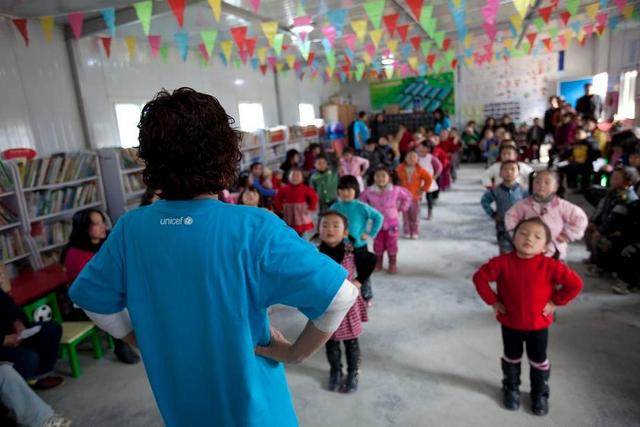“Build Back Better” Sichuan 2 Years Report
2010-05-12
On the 2-year anniversary day of Sichuan earthquake, Hong Kong Committee for UNICEF reported on progress made on recovery work in Sichuan.
As of April 2010, the Hong Kong Committee for UNICEF contributed HK$148 million, which represented close to half of all the donation received from all over the world for Sichuan emergency relief work.. UNICEF’s relief programmes focus on education, child protection & psychosocial support, water & sanitation & hygiene, and health & nutrition. The Hong Kong Committee for UNICEF works closely with UNICEF China as well as their Government counterparts, both in monitoring and supervising recovery work and in managing the use of funds. There are close to a hundred staff members stationing in China to access the needs of and implement programmes to help children and women affected by the devastating earthquake, The key achievements in the past two years are summarized as follows:Highlights of recovery:

- UNICEF has established 40 professionally led “Child-Friendly Spaces” in 40 townships in 21 counties of 8 prefectures. As a result, 100,816 children and over 5,000 parents are benefited. They serve as community-based child protection service centres that provide earthquake-affected children and their families access to psychosocial support, basic health information, early childhood development, social work, and non-formal education services. UNICEF found that almost 90% of children and women are able to recover with psychosocial services alone provided by Child-friendly Spaces, and the remaining 10% can resume to normalcy with more expert medical care as well.

- Good progress have been made on providing clean water and sanitation, all water supply construction projects have been completed, providing 73,700 earthquake-affected villagers (of which 18,200 are children) in 64 villages with access to safe drinking water. An exceeding of almost 2 times of the total number of beneficiaries expected is recorded.

UNICEF established 125 community-based kindergartens and preschools with equipments to monitor the growth and development of young children, outdoor play equipment, tricycles, televisions, storybooks, musical instruments, desks and chairs, blackboards, and ECD kits, benefiting 12,631 school children.- UNICEF is also working with the Ministry of Education to increase safety awareness among children and their communities. The Ministry of Education, with technical inputs from UNICEF, developed educational materials on emergency preparedness and school safety. UNICEF also assisted policymakers and technical experts, studied how to assess the earthquake resistance of school buildings, retrofit vulnerable buildings, and develop safety standards for new construction.
- UNICEF will extend the WASH interventions with the Government of China’s overall reconstruction programme in 2010 /11, so that software components of the project can be implemented properly. For example, the construction of remaining sanitation facilities will be completed with high quality and in accordance with national standards. Also, WASH technical training, health education and hygiene campaigns will also be conducted at province, county and village level.
- In Education and Child Protection, the sustainability of the 40 Child-Friendly Spaces transit to permanent buildings has to be ensured. With the speeding up of the reconstruction process, 4 of the CFS have already been relocated, moving from pre-fab structures to permanent buildings in schools and communities. An additional 16 CFS are facing relocation plans in 2010. UNICEF will be working closely with project partners at all levels to monitor the relocation and continuity of CFS, and provide necessary technical support to facilitate a smooth transition.
- UNICEF will continue to provide trainings to local counterparts, organizations and local units on child protection, water treatment maintenance, health and hygiene, and education so as to ensure that the newly built facilities are operated and maintained in a sustainable manner.










